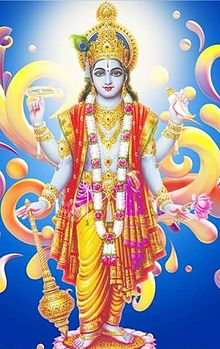Hari (deity)
Hari is a primary deity in Hinduism and an aspect of Vishnu .
etymology
Already in the commentary of the Adi Shankara on Vishnu Sahasranama , the thousand names of Vishnu, hari ( हरि ) is derived from the root of the verb hṛ (seize, take away, steal). In Vishnuism , this definition is expanded as one who takes away or removes evil or sin. The name Vishnus, which is practically interchangeable with Hari, is given here as the destroyer of samsara - the entanglement in the cycle of birth and death - as well as its triggering cause - ignorance. Hara , a name of Shiva , is translated as seizer, destroyer .
In Greek , hari means nobility, grace, mercy and kindness . Etymologically, (H) ari is also related to the Arya, the Aryans . Hari also appears in non-Indo-European languages, the peoples of which were dominated by Hindu culture in the Middle Ages and adopted Sanskrit borrowings. For example in Malay and Indonesian with the meaning day and in Tagalog with the meaning king .
description
Hari's skin color resembles water-laden clouds and he has four hands. Like Krishna or Rama , he is a light blue being. In his lower left hand he holds a lotus flower (padma), in his lower right hand the club (gada) called Kaumodaki , in his upper left hand the conch (shankha) called Panchajanya and in his upper right hand the throwing wheel called Sudarshana Chakra , the most destructive weapon in the Hindu religion. Sometimes he also carries the bow (sharanga) and is therefore also referred to as Sharangapani in the Bhagavad Gita .
As a mantra
Usually the phonetic syllable Om precedes everything, for example in Om Namah Shivaya , in Om Namo Bhagavate Vasudevaya or in Om Namo Narayanaya . Only Hari (or Harih) can also stand before Om as in the mantras Harih om or Harih om tat sat .
In literature and religion
The word Hari appears very frequently in later Sanskrit or Prakrit literature . It can also be found in Jainism , Buddhism and Sikhism . It has special significance as the 650th name of Vishnu in the Vishnu Sahasranama of the Mahabharata . Hence it is of great importance under Vaishnava . In the Hare Krishna Mahamantra of Gaudiya Vaishnava it occupies a central position, whereby it stands for both Krishna and Vishnu at the same time. Hare is the vocative of Harih.
The Harivamsha is a text in the tradition of Purana and Itihasa .
In animals, Hari refers to lions (including the zodiac sign), horses, and monkeys. The female form Harī represents the mythical mother ape in the Sanskritepes. In the Puranas, Hari stands for a class of gods under the fourth Manu (manu tāmasa, the "Dark Manu").
Hari is a component of many Hindu names such as B. Bhartrihari , Harendra (or Hari- Indra ), Harisha (or Hari- Isha ), Hariprasad, Harikesh (or Harikesha, the "golden-haired", also used as a term for Shiva and / or Savitar ).
In Sikhism, Hari is the word "हरि" "ਹਰਿ" consisting of the three letters of the Gurmukhi script . The name Hari appears more than 8500 times in Guru Granth Sahib , who is venerated by the Sikh .
See also
Individual evidence
- ↑ Swami Tapasyananda: Sri Vishnu Sahasranama, commentary by Sri Sankaracharya . Ramakrishna Math Publications, Chennai.
